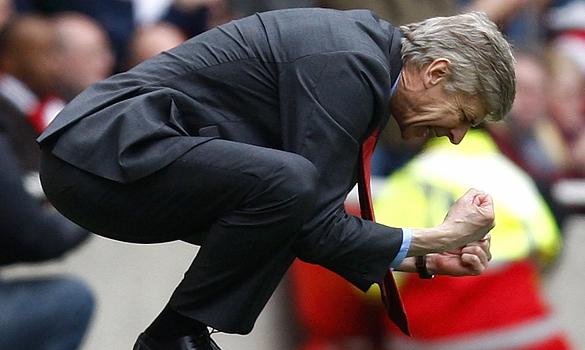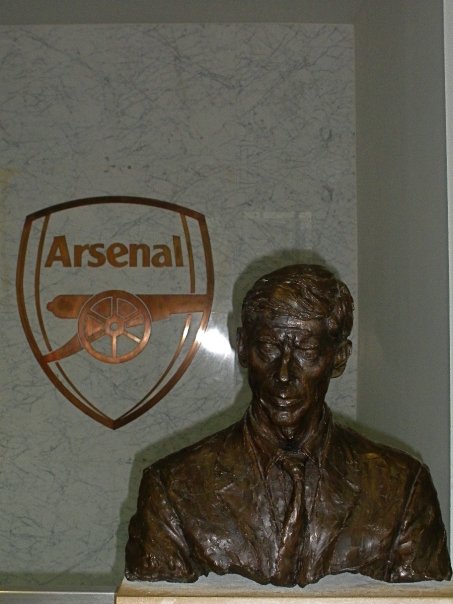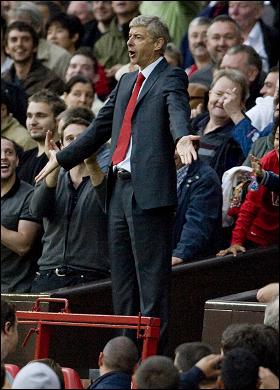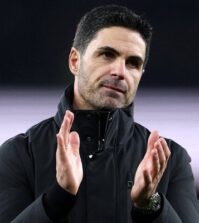- Arsenal hold discussion to sign Ruben Neves in January
- Arsenal in fierce battle to sign Juventus ace Kenan Yildiz
- Confirmed line-ups: Arsenal vs Aston Villa – Rice out, Timber returns
- Arteta confirms Arsenal January transfer plans
- Arsenal linked with shock swoop for Scott McTominay
- Predicted Arsenal line-up against Aston Villa
- Arsenal track Hoffenheim winger Bazoumana Toure
- Arsenal make contact to sign Aleksandar Stankovic
- Arsenal alert as Dembélé future at PSG draws attention
- Arsenal keep close watch on Rennes defender Jacquet
Arsene Wenger and Media Controversy
 If you read Arsenal Station regularly, you will know that I regularly criticize the British press, especially their treatment of Arsenal. Today, Arsenal Station guest contributor, Ted Harwood, continues that tradition with a look at the media’s reaction following the incident between Jack Wilshire and Jerome Thomas in Arsenal’s third-round Carling Cup match last weekend.
If you read Arsenal Station regularly, you will know that I regularly criticize the British press, especially their treatment of Arsenal. Today, Arsenal Station guest contributor, Ted Harwood, continues that tradition with a look at the media’s reaction following the incident between Jack Wilshire and Jerome Thomas in Arsenal’s third-round Carling Cup match last weekend.The football reporter’s job cannot be easy. He or she is expected to watch 90 minutes of play, attend a post-match interview with a manager or assistant, and cobble together not only about 500 words on the match itself, but related commentary and opinion focusing on the larger implications of the match beyond bulges of the net and league position.
For a club like Arsenal, this process happens probably close to sixty times per year, and the reading public expects every article to be interesting, fresh, and lively. Every bit of information and talk helps.
Thus, it is not surprising that the following exchange occurred at Arsène Wenger’s press conference on Tuesday evening after Arsenal’s 2-0 Carling Cup victory over West Bromwich Albion:
Reporter: Have you spoken to Roberto [DiMatteo]? He seemed upset with the sending off and particularly Jack Wilshere’s role in that. He seemed to suggest that something had been said that upset Thomas.
Wenger: I don’t know. My eyes are not great, and my ears are even worse [laughter], because I couldn’t hear anything from the touch line.
The question (or at least the presupposition behind it) is absurd and disingenuous. Wenger, exuding the maximum of his post-win charm and grace, turned the moment into a self-deprecating joke (this probably would not have happened after an Arsenal loss), but one feels that he could just have easily have said, “I was standing 150 feet away in a stadium full of people yelling in the middle of one of the largest conurbations on Earth.”

Being a media critic by training, I cannot help but wonder at the motivation behind asking a question when no satisfactory answer is possible, so please forgive me if I seem to be making a mountain of a molehill.
It does seem, though, that as the media’s need for information grows, this type of question becomes more exemplary, and Wenger, being a manager of one of the world’s largest clubs, will always face this type of questioning whenever there is a controversial moment.
To be fair, he does bring much of it on himself; he has even recently admitted that he only pretended to know nothing about events in the past in order to protect his players from the media pressure. But to ask him if he knows anything about what was said on the pitch is both fruitless, potentially aggravating, and certainly mischievous.
Even if Wenger did know something about what was said, it hardly matters at all in the immediate aftermath. The referee is the person solely responsible for interpreting events on the pitch, and (aside from the involved players) the best positioned to know what was said or done and how to handle it. A manager’s opinion, at least in a post-match presser, will not change the score.
Asking about a manager’s knowledge of events on the pitch beyond tactics and performance reveals more about the media than it does about the match, and 99% of the time it accomplishes little more than stoking controversy (which, of course, the media desires).
Immediately after a match, a manager is not going to come out and say that player x insulted player y’s wife, even if he had spoken to player x about the incident in the few minutes between the final whistle and the interview.
One almost suspects that the media expects managers to lie to protect their players, and asks of them questions that they could not possibly hope to know the answer to in the hopes of catching them out and creating more news.
Wenger has the trust of his players, and he will deal with any behavior that will damage the club, as would all competent managers, but to ask him immediately after a match what he knows about an incident of words between two players on the pitch is a silly fact of today’s media climate.








One Comment